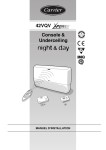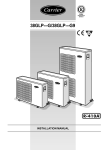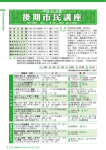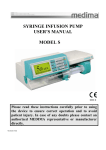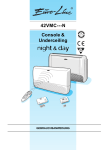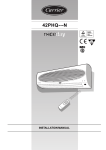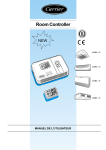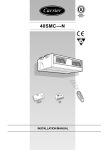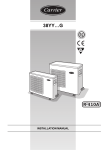Download Carrier 42VMC Installation manual
Transcript
42VMC---N The St rm al u INSTALLATION MANUAL ISO 9001 Q Console & Underceiling SI el sra fI ds Institution dar o an ity Assured Fi IR Remote Control “Room Controller” “Zone Manager” The unit can be used with infrared Remote Control, with the Carrier “Room Controller” or “Zone Manager”. Infrared control installation instructions are contained in the unit instruction and maintenance manual. Remote controls intallation instructions are contained in the relevant manuals, supplied with the remote controls. The operation and maintenance instructions for the indoor unit and the installation instructions for the indoor and the outdoor unit are given in the manuals for each unit. These are supplied with the unit. Contents Dimensions and weight ....................................................................................... Nominal data ........................................................................................................ Minimum clearances ............................................................................................ Connections ......................................................................................................... Material supplied ................................................................................................. Ceiling mounting kit ............................................................................................. Operating limits .................................................................................................... Accessories ......................................................................................................... General information ............................................................................................. Warnings: avoid ................................................................................................... Installation: 42VMC009N - 012N - 014N - 018N - 024N ...................................... Installation: 42VMC028N - 036N - 048N ............................................................. Refrigerant connections ...................................................................................... Electrical connection ........................................................................................... System configuration ........................................................................................... Operating test, address selector, fault code, ....................................................... Guide for the owner and accessories .................................................................. Air delivery and fresh air renewal ........................................................................ Fresh air renewal ................................................................................................. Page 2 2 2 3 3 3 3 3 4 5 6/7 8/9 10 11/13 14 15 15 16 17 Cooling only and heat pump models Cooling only and heat pump with electric heater Power supply 42VMC009 (A)*N 42VMC012 (A)*N 42VMC014 N 42VMC018 (A)*N 42VMC024 (A)*N 42VMC028N** 42VMC036N** 42VMC048N** 42VMC109N 42VMC112N — 42VMC318N 42VMC324N — — — 230V ~ 50Hz ENGLISH 42VMC---N Split system “Console & Underceiling night & day” indoor unit *(A) = Aluminium version ** = Underceiling version GB - 1 42VMC---N Dimensions and weights - Minimum clearances Minimum clearances Dimensions (mm) and weights Wall installation 009 - 024 42VMC009N - 42VMC024N 028 - 048 42VMC028N - 42VMC048N 500 min 500 min A B B A 100 min 50 min C Ceiling installation Ø 80 D 009 - 024 50 min 225 200 028 - 048 100 min 42VMC---N 009 012 014 018 024 028 036 048 A mm 850 850 1000 1000 1000 1200 1200 1200 B mm 540 540 600 600 600 610 610 610 C mm 40 40 40 40 40 --- --- --- D mm 50 50 50 50 50 --- --- --- kg kg 15 16 18 18 20 35 35 36 Table I: Nominal data POWER INPUT Cooling only unit (A/C) Heat pump (H/P) 42VMC009N - 42VMC009AN 42VMC012N - 42VMC012AN 42VMC014N 42VMC018N - 42VMC018AN 42VMC024N - 42VMC024AN 42VMC028N 42VMC036N 42VMC048N Cooling W 25 30 55 55 80 126 126 204 Heating W — — — — — — — — 42VMC009N - 42VMC009AN 42VMC012N - 42VMC012AN 42VMC014N 42VMC018N - 42VMC018AN 42VMC024N - 42VMC024AN 42VMC028N 42VMC036N 42VMC048N Cooling W 25 30 55 55 80 126 126 204 Heating W 25 30 55 55 80 126 126 204 42VMC109N 42VMC112N 42VMC318N 42VMC324N 25 30 55 80 1025 1030 2555 2580 42VMC109N 42VMC112N 42VMC318N 42VMC324N 25 30 55 80 1025 1030 1555 1580 • Unit is not suitable for operation in laundry premises. • For sizing of power supply wires and delay type fuses, refer to the outdoor unit installation instructions. GB - 2 42VMC---N Connections ENGLISH Outoor unit Indoor unit Height difference Note: Height difference / Connection length / Pipe bends: See outdoor unit installation manual. Table II: Material supplied Insulation for fittings Owner’s and Installation manual Mounting brackets Photocatalytic filter Acrylic-fibre filter Long screws and nuts Drilling template Drain hose adapter Wireless infrared remote control kit Condensate drain pipe cover Table III: Ceiling mounting kit (Only 42VMC028N - 036N - 048N) Upper and lower mounting strips (x2) Right and left mounting strips (x2) Anchor screw 3/8” x 2” (x6) Nut UNC - (x8) Left side bracket Screw UNC - 10 x 1/2” (x8) Metal screw #10 - 1/2” (x10) Right side bracket Table IV: Operating limits Cooling / Heating Table V: Accessories (1) Refer to outdoor unit installation manual. Nominal single-phase voltage Mains power Operating voltage limits supply Nominal three-phase voltage Operating voltage limits 230V 1~ 50Hz min. 198V – max. 264V 400V 3N~ 50Hz min. 342V – max. 462V Description Part number Condensate discharge 42VKG9002 pump 230V ~ 50Hz Cable cover kit 42VKG9003 Room Controller 33MC-RC Zone Manager kit 33MC9001 Hot water heating coil 42VKG9004 for mod. 009-012 Hot water heating coil 42VKG9005 for mod. 018-024 (1) The accessories have not been awarded IMQ certification. GB - 3 42VMC---N General information Unit installation Read this instruction manual thoroughly before starting the installation. • This unit complies with low-voltage (EEC/73/23) and electromagnetic compatibility (EEC/89/336) directives. • The installation must be carried out by a qualified installer. • Follow all current national safety code requirements. In particular ensure that a properly sized and connected ground wire is in place. • Check that voltage and frequency of the mains power supply are those required for the unit to be installed; the available power must be adequate to operate any other possible appliances connected to the same line. Also ensure that national safety code requirements have been followed for the mains supply circuit. • Connection of the system to the mains power supply is to be carried out in compliance with the wiring diagram shown in the installation instructions of the external section. • Connect indoor and outdoor units with field-supplied copper pipes by means of flare connections. Use insulated seamless refrigeration grade pipe only, (Cu DHP type according to ISO 1337), degreased and deoxidized, suitable for operating pressures of at least 4200 kPa. Under no circumstances must sanitary type copper pipe be used. • Failure to observe electric safety codes may cause a fire hazard in case of short circuits. • Inspect equipment for damage due to improper transportation or handling: file an immediate claim with the shipping company. Do not install or use damaged units. • In case of any malfunctioning turn the unit off, disconnect the mains power supply and contact a qualified service engineer. • This equipment contains R-410A refrigerant, a substance that is not depleting the ozone layer. • All of the manufacturing and packaging materials used for your new appliance are compatible with the environment and can be recycled. • Dispose of the packaging material in accordance with local requirements. • This equipment contains refrigerant that must be disposed of in the proper manner. When disposing of the unit after its operational life, remove it carefully. The unit must then be delivered to an appropriate disposal centre or to the original equipment dealer, for proper environmentally friendly disposal. • Use field-supplied 16 mm I.D. PVC pipe (not supplied) of appropriate length and with the correct thermal insulation for the condensate drain. • After installation thoroughly test the system operation and explain all system functions to the owner. • Leave this manual with the owner for consultation during future periodic maintenance. • Use this unit only for factory approved applications: the unit cannot be used in laundry or steam pressing premises. IMPORTANT: During the unit installation make first refrigerant connections and then electrical connections. When disassembling first disconnect electrical cables, then refrigerant connections. WARNING: Disconnect the mains power supply switch before servicing the system or handling any internal parts of the unit. • Do not open the remote controller to avoid possible damage. In case of malfunctioning contact a qualified service engineer. • This installation manual describes the installation procedures of the indoor unit of a residential split system consisting of two units manufactured by Carrier. Consult factory or a qualified system engineer prior to connecting this unit to any other manufacturer's outdoor unit. Coupling units which have different control systems, may cause irreversible damage and void the warranty protection. The manufacturer declines any liability for system malfunction resulting from unapproved coupling. • Operating conditions outside the operating range (“Connections”), will cause safety device tripping or damage to unit components. Choosing the installation site Positions to avoid: • Exposed to direct sun. • Too close to heat sources. • On humid walls or positions with water hazard, e.g. laundry premises. • Where curtains or furniture may obstruct free air circulation. Recommendations: • Choose an area free from obstructions which may cause irregular air distribution and/or return. • Check that the wall surface is flat enough to allow easy and safe installation. The wall structure should be strong enough to carry the unit weight and avoid deformation, rupture or vibration during operation. • Consider using an area where installation is easy. • Choose a position that allows for the clearances required (see drawing). • The manufacturer declines any liability for damage resulting from modifications or errors in the electrical or refrigerant connections. Failure to observe the installation instructions or use of the unit under conditions other than those indicated in Table IV (operating limits) of the outdoor unit installation manual, will immediately void the unit warranty. GB - 4 • Look for a position in the room which assures the best possible air distribution. • Install the unit in a position where condensate can easily be piped to an appropriate drain. 42VMC---N Warnings: avoid… ENGLISH ...any obstruction of the unit air outlet or return. ...exposure to direct sunshine, when unit is operating in cooling mode; always use shutters or shades. ...positions too close to heating sources which may damage the unit. ...exposure to oil vapours. ...connecting condensate piping to sewage system drain without appropriate trap. Trap height must be calculated according to the unit discharge head in order to allow sufficient and continuous water evacuation. ...installation in areas with high frequency waves. ...only partial insulation of the piping. ...installation not correctly levelled which will cause condensate dripping. ...any rise in the condensate drain piping.. ...horizontal condensate drain piping with less than 2% slope. ...flattening or kinking the refrigerant pipes or condensate pipes. ...excessive height difference between outdoor and indoor units (see installation manual of outdoor unit). ...slack on electrical connections. ...disconnecting refrigerant connections after installation: this will cause refrigerant leaks. ...unnecessary turns and bends in interconnecting tubing. ...excessive interconnecting tube length (see installation manual of outdoor unit). GB - 5 42VMC---N Installation: 42VMC 009N - 012N - 014N - 018N - 024N Vertical wall-mounting Template mod. 009N - 012N Template mod. 014N - 018N - 024N • The preferred arrangement is generally under a window sill on an external wall. This makes it easier to install the interconnecting tubing, electrical connections and condensate pipework to the outdoor unit. The indoor unit can also be installed against an internal partition if the connections to the outdoor unit can be concealed. • For better operation of the thermostat located on the unit, it is advisable to avoid unit installation in enclosed spaces. • There are three alternatives for the connections to the unit: parallel to the wall, through the wall or through the side. Holes for wall mounting Hanging brackets for horizontal mounting Plate Outdoor air intake Hole for refrigerant pipe Ceiling installation • Using the template supplied, drill the four holes in the ceiling and position four tie rods (not supplied). • Attach the unit to the tie-rods, as shown in the illustration. Preparation • Unpack the unit. • Open and remove the suction grille. To remove suction grille, remove the central lock using a pliers, then with a screwdriver remove the two side screws fixing the fasteners. • Locate the mounting template, supplied with the unit. Installation • Use the template supplied, and drill the four fixing holes in the wall. Use the four dowels provided. • Fix the attachment plate (using the two upper holes). • Attach the unit. • Fix the unit to the wall, using the two holes, positioned in the lower part. • Verify that the unit is level. GB - 6 • Ensure a minimum slope of 5 mm (refrigerant connection side must be lower) by modifying on the tie-rod fixing. 42VMC---N Installation: 42VMC 009N - 012N - 014N - 018N - 024N C ENGLISH Condensate drain pipe D For vertical installation Connect the PVC pipe to the connection on the drain pan. A Refrigerant connections B Condensate drain pipe A B A B IMPORTANT: The outdoor unit is designed to operate without the use of condensate water to cool the condenser coil. It is necessary to discharge the condensate directly into the sewer system, downpipes or to disperse it outside. For horizontal installation 42VMC---N 009 012 014 018 024 A mm 850 850 1000 1000 1000 B mm 786 786 940 940 940 C mm 237 237 250 250 250 D mm 237 237 285 285 285 To allow the condensate drain pipe to correctly come out of the unit, proceed as follows: Drilling the hole in the wall for the connection of the pipes • Remove from suction grille, the part of grille fixed tonguing, pressing it until tabs is unhooked. 75 mm Ø 80 mm 50 mm The pipes can exit the unit to three different directions (see illustration). For exit to the rear, the wall hole must be made in the position shown in the illustration. Ø 70 / 80 mm 5-10 mm Indoors Outdoors Drill a 70 or 80 mm diameter hole. The hole must have a 5-10 mm downward slope towards the outside. Insert the plastic conduit provided. Pass the electrical connecting wires through the conduit (see electrical connections). Mount condensate drain pipe cover supplied, fitting it as necessary. In the event of condensate discharge pump is used (accessory), the condensate drain pipe can exit together with the refrigerant pipes. GB - 7 42VMC---N Installation: 42VMC 028N - 036N - 048N Ceiling installation (42VMC 028N - 048N) Installation • To assemble the ceiling bracket, use the 4 mounting strips and the 8 UNC-10 screws and nuts, as shown in figure. • Fasten the ceiling bracket to the ceiling using the 6 anchor screws, as shown in figure. • The location of the ceiling bracket should allow a minimum gap between the indoor unit and nearby walls, as shown on page 2. Minimum 100 mm Note: The anchor screws provided are intended for use with concrete ceilings. Use fasteners which are appropriate for the type of ceiling present at the installation site. Refrigerant Lines Outdoor Sensor Cable • Use the template supplied, and drill the 6 fixing holes in the wall. Use the 6 dowels provided. Template mod. 028N - 048N 141 210165 900 360 533 555 Drainage Tube Ø 80 510 Electrical Cable 513 28 3 4 Preparation • The piping connecting the indoor and outdoor units can be routed in one of two directions, as shown in figure. 509 • If the piping is routed horizontally (direction no. ), the pipe cover at the bottom of the air conditioner must be removed. 5 1042 Frame Outdoor air intake Hole for refrigerant pipe • If the piping is routed vertically (direction no. ), a water pump must be installed for drainage (supplied separately, by request). MO Bracket screws Anchor screws GB - 8 DE FA N 42VMC---N Installation: 42VMC 028N - 036N - 048N ENGLISH • Remove the air conditioner front panel and air intake grille, as shown in the figure. For horizontal installation • Fix the attachment plate (using the two upper holes). • Remove the plastic cap shown in picture to allow the condensate drain pipe to come out of the unit. • Attach the unit. • Fix the unit to the wall, using the two holes, positioned in the lower part. • Verify that the unit is level. Left side bracket Special nut Pipe cover Right side bracket • Fasten the top and right side strips to the air conditioner using 6 sheetmetal screws, as shown in figure. Ensure that: Models 028-048 1. The wide side of the strip is located at the bottom of the air conditioner. 2. The strip angle faces inward. • Each unit is provided with a condensate pipe cover. The lenght of this cover should be adjusted depending on the distance between unit and wall. • Mount the indoor unit on the bracket. Slide the protruding parts of the side strips onto the ceiling bracket so that the 4 safety screw holes on the left and right strips align with those on the ceiling bracket. • Make sure the air conditioner is tilted slightly toward the drainage outlet on its right side. Use water to test for proper drainage. You can fix the tilt by adjusting the height of the right strip relative to the left one. • Fasten the air conditioner to the ceiling bracket using the 4 side screws (see figure). 3 FASTEN THE 4 SAFETY SCREWS ON THE SIDES OF THE AIR-CONDITIONER 2 1 SLIDE THE AIRCONDITIONER INTO THE MOUNTING STRIPS MAKE SURE THAT THE PROTRUDING PARTS OF THE SIDE STRIPS FIT INTO THE RUNNERS ON THE MOUNTING BRACKETS • In a condensate discharge pump is used (accessory), the condensate drain pipe can exit together with the refrigerant pipes. GB - 9 42VMC---N Refrigerant connections Make refrigerant connections before connecting the system to the power supply. Refer to the outdoor unit installation manual for tube sizing, and limitations (slopes, length, number of curves allowed, refrigerant charge, etc.) Model 42VMC---N Connection to the unit Insufficient tightening torque will cause gas leaks. Overtightening the fittings will damage the tube flaring and cause gas leaks. Tubing diameter Gas Liquid (Suction) (Discharge) mm (inches) mm (inches) 009 012 014 018 024 028 036 048 9.52 (3/8”) 6.35 (1/4”) 12.70 (1/2”) 6.35 (1/4”) 12.70 (1/2”) 6.35 (1/4”) 12.70 (1/2”) 6.35 (1/4”) 12.70 (1/2”) 6.35 (1/4”) 15.87 (5/8") 6.35 (1/4") 19.05 (3/4") 9.52 (1/4") 19.05 (3/4") 9.52 (1/4") • For refrigerant tubes use seamless, insulated refrigeration grade tube, (Cu DHP type according to ISO 1337), degreased and deoxidized, suitable for operating pressures of at least 4200 kPa. Under no circumstances use sanitary type copper pipe. Note: • Do not kink or flatten the tubes. • Avoid bends with a bending radius of less than 100 mm. • Do not bend copper tubes more than three times at the same point. • Do not remove flare fittings from unit tubes before actually making the connections. • Do not fasten the insulation too tightly to the tubes with straps or tape. Adijustable wrench or torque wrench Connecting pipes Unit connections Tubing diameter mm (inches) Torque Nm 6.35 (1/4”) 18 9.52 (3/8”) 42 12.70 (1/2”) 55 15.87 (5/8") 65 19.05 (3/4") 100 Flaring the end of the tubing Tube insulation Fastening tape Once all connections have been completed, check for leaks by applying soapy water to them. If incorrect connection or removal of the unit results in a refrigerant gas leak, check the refrigerant charge as indicated in the “OUTDOOR UNIT INSTALLATION MANUAL”. Remove protective caps from the copper tube ends. Position tube end downward, cut the tube to the required length and remove the burrs with a reamer. Finally wrap connections with anti-condensate insulation and tighten with tape, without exerting great pressure on the insulation. Remove flare nuts from the unit connections and place them on the tube end. Flare the tube with a flaring tool. Repair and cover any possible cracks in the insulation. L L Connection pipes and electric cables between indoor and outdoor units must be fixed to the wall with appropriate conduits. Check Flare end must not have any burrs or imperfections. The length of the flared walls must be uniform. Finger-tighten the fitting several turns, then tighten it fully with two wrenches by applying the tightening torque indicated in the table. GB - 10 Pour water into the condensate drain pan and check that it flows freely to the drain. 42VMC---N Electrical connections ENGLISH Connection of the system to the mains power supply is to be carried out in compliance with the wiring diagram shown in the installation instructions of the external section. • Make electrical connections between units prior to proceeding to mains supply unit connection. • Before proceeding with the unit connection to the mains supply locate live L and neutral N, then make connections as shown in the wiring diagram. • Ensure that mains supply connection is made through a switch that disconnects all poles, with contact gap of a least 3 mm. • The mains supply connecting cable must be H07 RN-F type (or higher), with synthetic rubber insulation with Neoprene coating, according to EN 60335-2-40 code. • Ground connection between indoor and outdoor unit is made via the refrigerant pipes. • With the cable clamp supplied, secure the connecting cable between the two units. • Fasten the electric connecting wires with refrigerant tubes together. Allow an additional length to the electric wires for easy connection to the unit connectors. Notes: • For sizing of power supply wires and delay type fuses, refer to the outdoor unit installation instructions. • All field electrical connections are the responsibility of the installer. IMPORTANT: The units are provided with electronic control. A time-delay device provides a 3 minute starting delay of the compressor every time the unit is stopped or when it is initially switched on. Electric heaters connection Jumper positioning: Units are equipped with a jumper inside the electric control box, to make them suitable for the two installation typologies: • If the indoor unit is provided with an electric heater, it must be powered separate from the unit. Wall vertical installation: jumper inserted. • Make sure that connection to the mains power supply is made through a single-pole switch with contact gap of at least 3 mm. Ceiling horizontal installation: jumper removed. To reset incorrect jumper positioning, proceed as follows: • Disconnect the power supply. • Reposition the jumper correctly. • Make sure that yellow/green cable stripping is longer than the others. • Fasten the electric heater supply cable under the single cable holder. • Connect the power supply. IMPORTANT: • Make refrigerant connections before electrical connections. When disconnecting, disconnect electrical connections before refrigerant connections. • Models 42VMC 009N, 012N, 014N: make ground connection prior to any other electrical connections. Control and safety devices The following control and safety devices are built into the indoor units (see wiring diagrams): • Room air thermostat adjustable from 18°C to 32°C. • Motor with overheat/overcurrent protection. GB - 11 42VMC---N Electrical connections Cooling only Unit L N N 42VMC 009N, 012N, 014N System Y O W2 NOTE: See outdoor unit installation manual. 42VMC 018N, 024N, 028N, 036N, 048N Unit R C Y System O W2 S NOTE: See outdoor unit installation manual. Minimum connection wire size between indoor and outdoor units (mm2) Models L N N R C Y 42VMC 009N 2.5 2.5 1.5 – – 1.5 42VMC 012N, 014N 2.5 2.5 2.5 – – 2.5 42VMC 018N, 024N – – – 1.5 1.5 1.5 Terminal box legend L N N R C Y Earth. Live power supply. Neutral power supply. Neutral connection indoor/outdoor unit. Live connection indoor/outdoor unit. Neutral connection indoor/outdoor unit. Compressor interlocking contact. GB - 12 10 120 10 100 Power supply cable (direct power supply – shunted from outdoor unit) Interlocking cable 42VMC---N Electrical connections ENGLISH Heat pump Unit L N N 42VMC 009N, 012N, 014N System Y O W2 NOTE: See outdoor unit installation manual. 42VMC 018N, 024N, 028N, 036N, 048N Unit R C Y System O W2 S NOTE: See outdoor unit installation manual. Minimum connection wire size between indoor and outdoor units (mm2) Models L N N R C Y O W2 S 42VMC 009N 2.5 2.5 1.5 – – 1.5 1.5 1.5 – 42VMC 012N, 014N 2.5 2.5 2.5 – – 2.5 2.5 2.5 – 42VMC 018N, 024N – – – 1.5 1.5 1.5 1.5 1.5 1.5 Terminal box legend L N N R C Y O W2 S Earth. Live power supply. Neutral power supply. Neutral connection indoor/outdoor unit. Live connection indoor/outdoor unit. Neutral connection indoor/outdoor unit. Compressor interlocking contact. Reversing valve control. Outdoor fan signal. Defrost end signal. 10 120 10 100 Power supply cable (direct power supply – shunted from outdoor unit) Interlocking cable GB - 13 42VMC---N System configuration System configuration Units are factory configured as heat pumps. When a cooling only system is installed, it is necessary to change the factory configuration. Such operation must be performed by the installer as follows: Cooling only configuration (of the system) • • • • Check all electrical connections (instructions and wiring diagram). Insert the batteries into the remote control and leave it OFF. Energise the system, turning the power supply ON. Press the and buttons of the infrared remote control and hold them pressed for more than 5 seconds. • The display will be cleared, the time segments will display the first configuration item (rAdr = remote address) and the temperature segments will display the default value of this configuration item (Ab = control of both indoor units). repeatedly until “UCFG” is displayed. • Press button button to change the default value (HP) • Press either the or to the new value (AC). • Press button to transmit the new configuration to the unit. • Press button to leave the configuration menu. For other available configuration options, see table VI. GFD Multisplit/T-Kit configuration • • • • Check all electrical connections (instructions and wiring diagram). Insert the batteries into the remote control and leave it OFF. Energise the system, turning the power supply ON. and buttons of the infrared remote control and Press the hold them pressed for more than 5 seconds. • The display will be cleared, the time segments will display the first configuration item (rAdr = remote address) and the temperature segments will display the default value of this configuration item (Ab = control of both indoor units). button until will appear “GFdn” on the display. • Push • Through the buttons and to change the default value “1” into 239 for T-KIT configuration or 240 for MULTISPLIT configuration. • Press the button to send the configuration to the unit, which will confirm with a “beep”. button to exit from this configuration menu. • Press the Note: When 30 seconds have elapsed and no buttons have been pressed, the remote controller will automatically exit the configuration menu and the procedure has to be restarted. Cooling only configuration (of the remote controller) • Insert the batteries into the remote controller and leave it OFF. • Energize the system, turning the power supply ON. and buttons of the infrared remote control and • Press the hold them pressed for more than 5 seconds. • The display will be cleared, the temperature segments will display the first configuration item (CH = remote address) and the time segments will display the default value of this configuration item (Ab = control of both indoor units). repeatedly until “rc” is displayed. • Press button or button to change the default value (HP) • Press either the to the new value (AC). button to transmit the new configuration to the unit. • Press • Press button to leave the configuration menu. For other available configuration options, see table VII. Note: When 30 seconds have elapsed and no buttons have been pressed, the remote controller will automatically exit the configuration menu and the procedure has to be restarted. Table VI Item Shown on display Explanation Description 1 “rAdr” “A”: remote unit A “b”: remote unit B “Ab”: remote units A and B “HP”: heat pump “AC”: cooling only Remote address indoor unit A. Remote address indoor unit B. Default address is both indoor units. Default address is heat pump. Change address for cooling only. CCN unit address. Default = 1. Number of zone. Default = 0. Number of GFD. Default = 1. 239 = configured as T-kit 240 = configured as multisplit Choose of operating mode after a power supply interruption. 2 “UCFG” 3 “UAdr” 1-240 with increase of 1 4 “ZONE” 1-240 with increase of 1 5 “GFdn” 1-240 with increase of 1 6 “A St” “OF”: unit in stop mode “On”: automatic restart Table VII Shown on display “CH” “tU” “rc” “HR” “CR” “CL” Explanation Description “A”: unit A “b”: unit B “Ab”: units A and B “C”: Degrees Celsius “F”: Degrees Fahrenheit “HP”: heat pump “AC”: cooling only 17 – 32: 17°C ÷ 32°C 63 – 90: 63°F ÷ 90°F 17 – 32: 17°C ÷ 32°C 63 – 90: 63°F ÷ 90°F 12 : 12: 12 hour clock (AM/PM) 24 : 24: 24 hour clock Address indoor unit A. Address indoor unit B. Default address is both indoor units. Temperature. Default is °C. Default address is heat pump. Change address for cooling only. Heating temperature range °C min. and max. Heating temperature range °F min. and max. Cooling temperature range °C min. and max. Cooling temperature range °F min. and max. Time format (AM = morning; PM = afternoon). Default is 12 : 12. NOTE: If the selection is changed from “rc” (HP operation) to cooling only and the remote control operating mode is auto or heating, the operating mode is set to cool. GB - 14 NOTE: If the “HR” is set to a value that is lower than “CR” and the remote control operating mode is auto, the operating mode is set to cooling. 42VMC---N Operating test, address selector, fault code, guide for the owner and accessories ENGLISH Operating test Fault code • Perform the operating test after the units have been installed in position and the gas leak test has been completed. • Check all electrical connections (instructions and wiring diagram). • Insert the batteries into the remote control and leave it OFF. • Energise the system, turning the power supply ON. • Press the and buttons of the infrared remote control and hold them pressed for more than 5 seconds. The display will be cleared, the time segments will display the icon (Src = service test). • After test has been completed, press button to leave the test menu. Once a failure occurs with the indoor unit in operation, the green unit LED flashes at intervals of 0.5 seconds. The fault code is deduced from the number of times the green LED flashes, blocking unit operation. Between one flash cycle and the next one, a pause of 5 seconds elapses. Note: When 30 seconds have elapsed and no buttons have been pressed, the remote control will automatically exit the test menu and resume its normal operation. Table VIII: Fault code Code 3 Description Room air sensor fault 4 Indoor unit coil sensor fault 6* Filter dirty 7 Outdoor unit failure Address selector 10 EEPROM corrupt 11 Unit address incomplete If you are installing two indoor units in the same room and you want them to operate in independent mode, it is necessary to assign each unit its own address so that each unit can operate via its own remote control. For configuration, proceed as follows: 12 Address / zone incomplete 13 Gas flow distributor corrupt * with enabled code Configuration (of the unit) • Press the and buttons of the infrared remote control and hold them pressed for more than 5 seconds. • The display will be cleared, the time segments will display the first configuration item (rAdr = remote address) and the temperature segments will display the default value of this configuration item (Ab = control of both indoor units). or button to change the default value (Ab) to • Press either the the new value (A) or (b). button to transmit the new configuration to the unit. • Press button to leave the configuration menu. • Press Configuration (of the remote controller) • Press the and buttons of the infrared remote control and hold them pressed for more than 5 seconds. • The display will be cleared, the temperature segments will display the first configuration item (CH = remote address) and the time segments will display the default value of this configuration item (Ab = control of both indoor units). or button to change the default value (Ab) to • Press either the the new value (A) or (b). button to transmit the new configuration to the unit. • Press button to leave the configuration menu. • Press Guide for the owner When installation and tests are completed explain the Operation and Maintenance Manual to the owner, with particular attention to the main operating modes of the air conditioner, such as: • Turning the unit on and off. • Functions of the remote control. • Removal and cleaning of the air filters. Note: When 30 seconds have elapsed and no buttons have been pressed, the remote control will automatically exit the configuration menu and the procedure has to be restarted. Leave the two installation manuals for the indoor and outdoor units with the owner for future use during maintenance operations or for any other needs. Table IX: Accessories Description Part number Condensate discharge pump 230V ~ 50Hz Cable cover kit 42VMC---N 014 018 024 028 009 012 42VKG9002 42VKG9003 036 048 GB - 15 42VMC---N Air delivery Wall installation, cooling Air delivery direction Wall installation, heating Ceiling installation, cooling Ceiling installation, heating “No draught” (guide vane fully open) (position recommended for ceiling installation in cooling mode, to avoid draughts) IMPORTANT: Air is supplied into the room through the grilles located on top of the cabinet; air from the room is drawn into the unit through the grilles and filter at the bottom of the unit. GB - 16 Make absolutely sure that the above parts are not obstructed (even partially). 42VMC---N Fresh air renewal ENGLISH Hole for external air intake Models 009N - 012N Models 014N - 018N - 024N Ø 70 Ø 74 Models 028N - 048N 100 Ø 80 570 Units are prearranged for introduction of renewal air through a prepunched hole located on back side. Back knockout allows connection of fresh air inlet duct. • Use locally purchased material, suitable for operating temperatures of 60 °C (continuous). Conduits can be of flexible polyester (with spiral core) or corrugated aluminium, externally covered with anti-condensate material (fibre glass from 12 to 25 mm thickness). • To complete the installation, all non-insulated ducts must be covered with anti-condensate insulation (ex. expanded neoprene, 6 mm thickness). • The supplementary fan motor for outside air intake has to be supplied separately and controlled by a bipolar ON-OFF switch with safety fuses (field-installed). To adjust the fan motor air flow to the required values it is advisable to install a speed controller. Fresh air flow must be less than 10% of the total air flow, to avoid operating problems. For fresh air ventilation rates higher than 10%, a primary air treatment system with separate deflectors is recommended. • Install an air inlet grille with filter inspection port to prevent dust and dirt from entering and fouling the indoor unit heat exchanger. Filter installation also makes the installation of a duct closing damper during shutdown periods unnecessary. Not observing of these instructions may cause condensate dripping; the manufacturer will not be held responsible for any damage caused. GB - 17 L010125H89 - 1102 Via R. Sanzio, 9 - 20058 Villasanta (MI) Italy - Tel. 039/3636.1 The manufacturer reserves the right to change any product specifications without notice Order No. 14496-74, November 2002. Supersedes Order No. (new). Printed in Italy




















